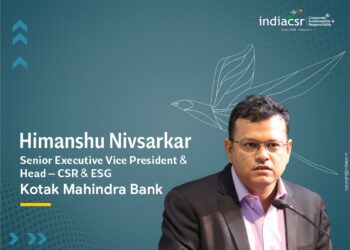Rusen Kumar, editor, India CSR talked to Devyani Rajya Laxmi Rana, Vice President – Public Affairs, Communications and Sustainability for Coca-Cola India and Southwest Asia.
Excerpts of an interview:
What are key sustainability priorities for Coca-Cola in India?
We believe in ‘Refreshing the World & Making a Difference’ – Our journey is deeply rooted in our purpose and entails a clear vision of adding value to the lives of our consumers, partners, and the communities we serve. The cornerstone of our sustainability management is identifying and focusing on the highest-priority ESG issues for our company, system and stakeholders. We engage with both our internal and external stakeholders to develop deeper insights into the ESG aspects that are material to our business.
In the past year, there has been a strong emphasis on creating an ‘Atmanirbhar Bharat’, India’s journey of economic self-reliance. We have developed concerted initiatives such as World Without Waste, Water Leadership, Fruit Circular Economy, 5by20 for our ESG priorities. Our interventions are geared towards creating effective and sustainable socio-economic models.
Can you cite some key milestones across the company’s sustainability pillars that have been achieved in the last decade?
Our Sustainability Update for the year 2020-2021, marked the completion of 11 years of sustainability reporting in India, in line with the Company’s principle of ‘building sustainable communities as the foundation of sustainable businesses. Our annual India Sustainability Report is a testimony of the transparency with which we endeavor to make a positive impact on the society and country at large.
Several corporates have revisited their CSR strategy taking learnings from the pandemic. How have pandemics reinvigorated Coca-Cola’s outlook towards sustainability at large?
The entire pandemic has been an experience filled with learning, looking for opportunities, and overcoming the challenges keeping in mind our priorities of the business, people and community – all of which have led to re-invigorating the synergies of our business. This further strengthened our commitment to strengthen the sustainability priorities we set for ourselves in India.
India has always been recognized as a farmer’s nation. How do you think the Fruit Circular Economy initiative will help farmers?
Our company launched Project Unnati, a part of the ‘Fruit Circular Economy initiative in 2011. Since then, the Fruit Circular Economy has endeavored to make a concerted difference in the Indian fruit ecosystem. The company has been leveraging its capability of building demand as well as ensuring surplus availability of Indian fruits, thereby meeting both local and export requirements. With a focus on increasing farm productivity through innovation and technology, Coca-Cola has been supporting the cause of doubling farmer incomes over the years.
Project Unnati has thoroughly evolved to make real, purposeful interventions at each step of the agricultural value chain. The program encourages reduced input costs for farmers, higher productivity, local procurement of agro products, increasing export demand for locally produced fruits and driving economic prosperity of the farmer communities while reducing the waste across the value chain. The company has further strengthened the reach of the initiative and aims to bring in more fruit varieties to enable a more efficient and productive farming community. In the next 3 years, the initiative aims to impact 500,000 farmers.
Can you tell us more about the India Plastics Pact and its significance?
India Plastics Pact is a collaborative initiative to bring together businesses, governments and NGOs so that plastics can be reduced, recycled and reused in our value chain. With the launch of this, India became the first Asian country to have a plastics pact in action and Coca-Cola is proud to be one of its founding members. The aim here is to create a world where plastic is valued and does not pollute the environment. This pact is supported by UK Research & Innovation (UKRI) and WRAP, a global NGO based in the UK. Through this pact, by 2030, we aim to make 100% of plastic packaging to be reusable or recyclable, 50% of plastic packaging will be effectively recycled and achieve a 25% average recycled content across all plastic packaging. The India Plastics Pact aims to empower businesses, governments and the entire plastics value chain to stimulate innovative new business models and reduce the total amount of plastic packaging.
What efforts have been made by the company to ensure women’s empowerment on a broader scale in the country?
At Coca-Cola, we have made strides towards promoting women’s empowerment, both in our organization, as well as in the communities that we are involved with.
Within our company, we initiated programs including Diversity Sensitivity Training for the Leadership Council, Crèche Support Policy and a Flexi-time Policy. Focused training such as the Women Leadership Program, Gender Smart Workshop and Inspirational Leadership Industry Interactions, is intended to act as a catalyst towards the improvement of our gender diversity ratios. As a consequence of this, 33% of our workforce and 31% of our leadership constitutes female power.
For our community, in 2010, The Coca-Cola Company announced a global initiative called the 5by20 for economic empowerment of 5 million women entrepreneurs across our value chain by the year 2020. We are proud to share that we surpassed our goal, enabling the empowerment of more than 6 million women through 318 programs across 100 countries. In India, we enabled approximately 21,796 women in 2018 and the total number of women entrepreneurs impacted by our 5by20 initiative since 2010 has crossed 1,52,000, through our 3 major initiatives; Parivartan, Pragati & Unnati and also by setting up HCCB Career Development Centers across the country.
How does the company plan to ensure these initiatives are sustained in the future?
Sustainability has been and will always be the heart of our operations. We have always focused on creating a sustainable business and better-shared future that makes a positive difference in communities and our planet.
Our current efforts towards various different initiatives have proved to be impactful and we very strongly believe that we have to keep pushing the needle forward. With the India Plastics Pact and our World Without Waste initiative, we still have miles to go in order to reach our vision and targets. We are also looking forward to providing even more benefits through our already successful initiatives like Water Stewardship and 5by20 and taking them to new heights of success.
What is your assessment of sustainability beyond COVID-19? How is the company looking at Sustainability 2021 and beyond?
2021 and beyond will witness a stronger commitment to our ESG priorities for which we are identifying and focusing on issues that matter most to us and our ecosystem. We aim to be one of the top companies reckoned with sustainability goals globally. The Coca-Cola Company endorses various global charters and principles like UN Global Compact, Sustainable Development Goals (SDGs), GoI priorities such as Swachch Bharat, Jal Shakti Abhiyan, Kuposhan Mukt Bharat, to name a few. In India, we work with various organizations and industry bodies on our sustainability priorities, pertinent issues that are relevant to our stakeholders. We act in ways to create a more sustainable and better-shared future and aim to make a difference in people’s lives, communities, and our planet by doing business the right way.
We are constantly trying to innovate to be ahead of the curve, which is why we partner with communities, governments, municipalities, non-profits, and other experts in the green space. We have been energized by the outcome so far and will continue to collaborate towards creating a better-shared future.
























